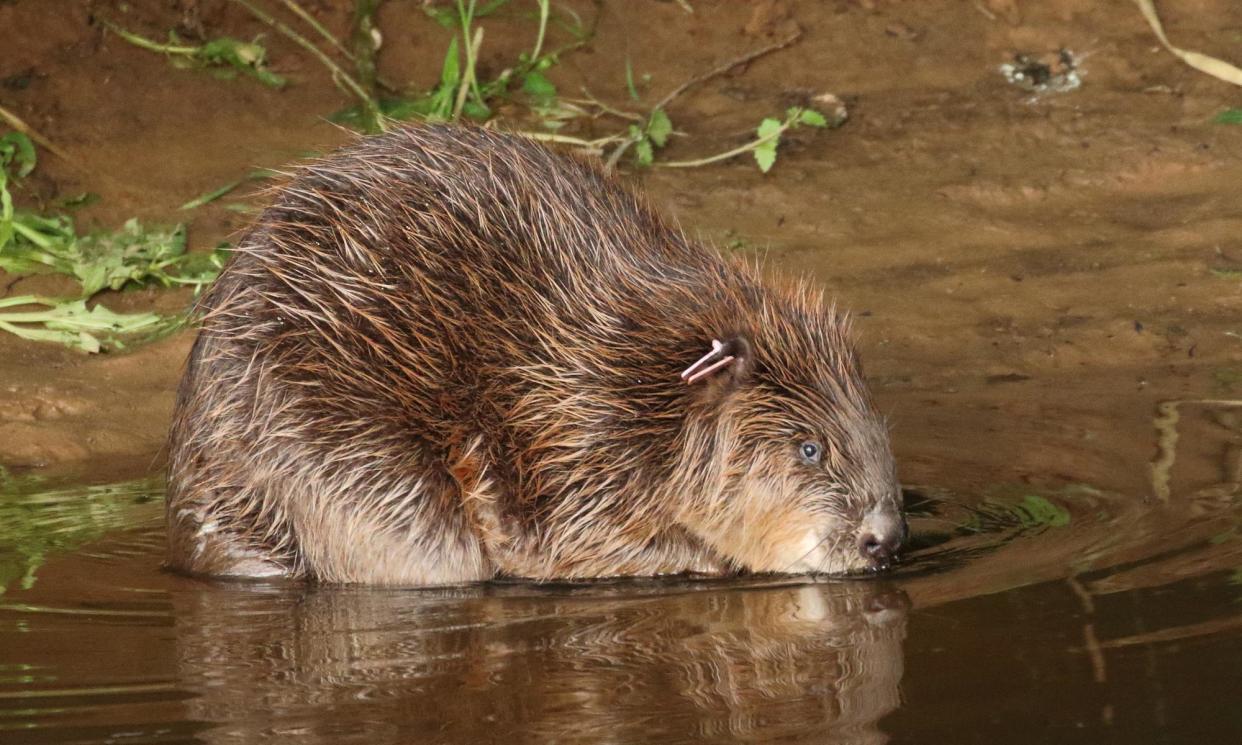Beavers transform Devon’s River Otter – but their return across England and Wales has stalled

On a winding country lane in a secret location in east Devon, just a few metres from the side of the road, an inconspicuous pile of logs, twigs, sticks and leaves has been crammed over the rushing River Otter.
Passersby would not give this messy mound a second thought, but closer inspection reveals a very deliberate quality to its construction, in the form of neatly cut branches layered in a distinctive pattern. This is a wild beaver dam.
“The animals on this river system, no one is putting their hands up saying how they got here,” says Steve Hussey, of Devon Wildlife Trust, crouching on the bank. “They just appeared so they could have escaped or [been] deliberately put there.”
The beavers first appeared in the Otter catchment in 2008. In 2015 the Devon Wildlife Trust launched a trial to reintroduce the species and in 2020 the government announced that Devon’s beavers could stay and spread naturally into other river catchments. The trust estimates that the industrious rodents are now living in 20 separate family territories along the river and its tributaries.
In 2022, legislation in England made it an offence to deliberately capture, injure, kill or disturb beavers, or damage and destroy their breeding sites or resting places.
But in the last two years, the Wildlife Trusts – a coalition of conservation charities across England and Wales – has argued that the UK government has “repeatedly failed” to put in place the steps needed for a widespread return of the species.
They are calling for urgent action including the issuing of licences for beavers to be returned to the wild in England and the publishing of strategies to enable the animals to be reintroduced. In Wales, there is still no legislation to protect beavers and enable their effective management.
“Beaver bombing” – covertly releasing beavers into the countryside – is increasing in England as a result of successive governments failing to fulfil promises to permit planned wild releases. It is now well established through studies such as those undertaken by the University of Exeter that beavers can play an important role in flood prevention, filtering water and boosting wildlife habitat.
Around the dams along the River Otter, the transformation is plain to see. The raised water table has seen wetlands bloom around the beaver habitats – thick reeds, marshland, deep pools of water – bringing with them benefits for diversifying wildlife and capturing carbon, a vital natural defence against the climate emergency.
Hussey beats through nettles to the site of another larger dam, curved across the river under a canopy of oaks, hazels and sycamores and scattered with the leaves of maize plant grown on the farm nearby. A fish leaps from the pool that has built up behind the dam’s barrier. Birdsong pierces the quiet of the woodland.
“We’re so used to our environment being neat,” Hussey says. “This is to a lot of people a bit messier but it’s a patchwork of habitats.”
A study by the University of Exeter found that together the wetlands created by the beavers were storing more than 24m litres of water, equivalent to about 10 Olympic-sized swimming pools.
Using data from the Environment Agency’s river gauging stations, researchers found that beaver dams and their wetlands can significantly reduce storm flows by an average of 30% during periods of heavy rainfall – reducing the flood risk to communities downstream.
The Wildlife Trusts on Thursday published a “vision” – in essence a call to action – underlining how releasing beavers into the wild will provide beleaguered wetlands with a powerful natural restoration tool.
“The benefits of beavers are widely acknowledged and well evidenced – but across England and Wales, the reintroduction of this keystone species has stalled,” Rob Stoneman, director of landscape recovery at the Wildlife Trusts, said. “Given the climate and nature crises, we need beavers back in the wild to give us a hand to resolve these challenges.”
He added: “The nations’ governments must accept that beavers are here to stay and embrace the big positives they bring so that society can reap the rewards too.”
The Wildlife Trusts want the UK and Welsh governments to publish a beaver reintroduction strategy, fund farmers and land managers to make more space for water on their land, support management groups, confirm all wild beavers can remain in England and Wales, recognise the animal as a native species in Wales and provide them with full legal protection.
A Department for Environment, Food and Rural Affairs spokesperson said: “This government is absolutely committed to restoring and protecting nature and we support species reintroductions where there are clear benefits for nature, people and the environment. We will continue to work with Natural England to develop our approach to beaver reintroductions in England.”
A Welsh government spokesperson said: “We’re considering a package of proposals following an evidence review by Natural Resources Wales. This includes exploring the most appropriate options for legally protecting the European beaver, together with policy and management proposals.”


